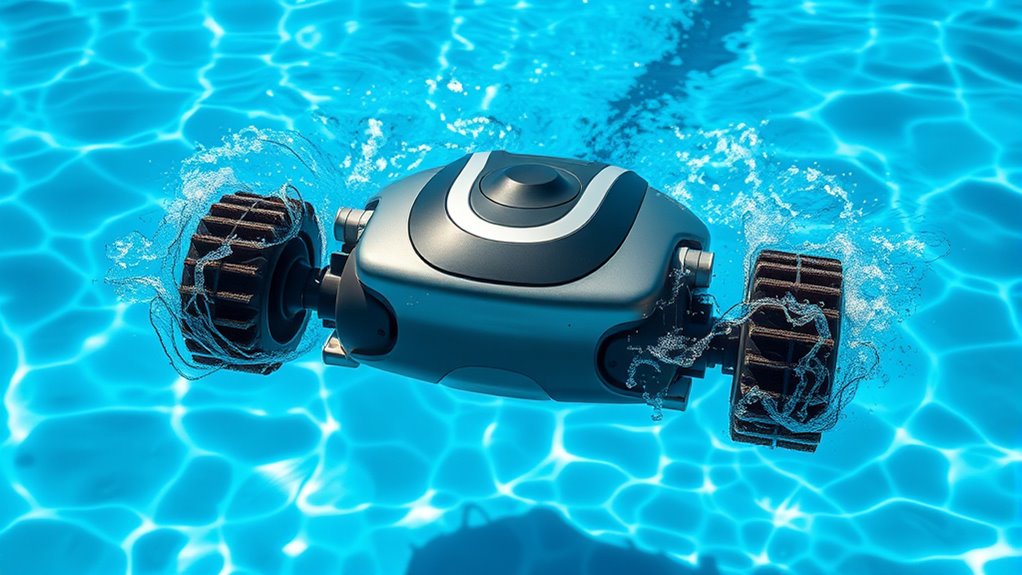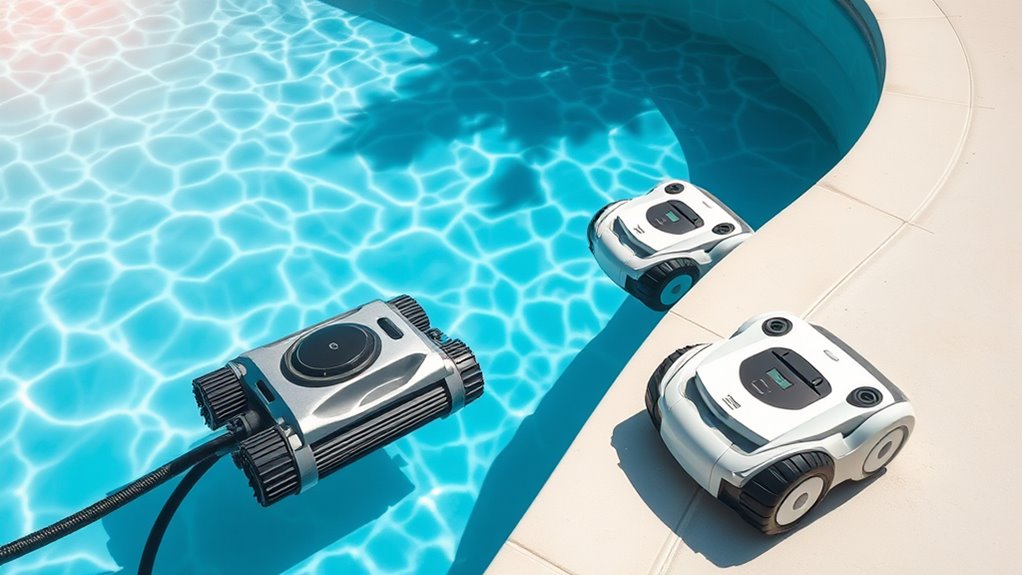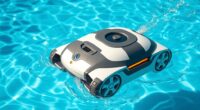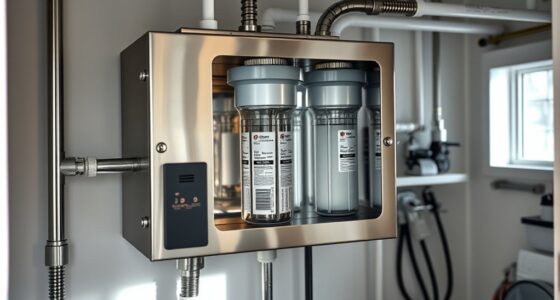Pressure pool cleaners remain a relevant and cost-effective choice for maintaining your pool, especially if you update them with modern technology. They use high-pressure jets to clean surfaces and are easy to operate, with low energy consumption compared to some alternatives. While newer robotic models offer advanced features, pressure cleaners still provide effective and reliable cleaning for many pool owners. To discover how to maximize their efficiency, keep exploring the latest innovations in pool maintenance.
Key Takeaways
- Modern pressure pool cleaners incorporate advanced technology, improving efficiency and durability, keeping them relevant despite new cleaning options.
- They remain a cost-effective, energy-efficient choice for many pool sizes and debris types, especially with ongoing technological improvements.
- Pressure cleaners are easy to integrate with existing pool systems, offering a convenient, automated cleaning solution.
- While robotic cleaners offer advantages, pressure cleaners still provide reliable performance at a lower initial investment.
- Staying informed about technological updates ensures pressure pool cleaners continue to meet modern pool maintenance needs.
How Pressure Pool Cleaners Work and Their Key Features

Pressure pool cleaners operate by using high-pressure water jets to move and scrub the pool’s surfaces effectively. They often feature automatic operation, allowing you to set them and let them work without constant supervision. This ease of use makes maintenance simpler and more convenient. Additionally, pressure cleaners are designed with energy efficiency in mind, using less power compared to other types of pool cleaners. Their efficient water jets propel the cleaner across the pool, saving energy while providing thorough cleaning. Many models include adjustable settings for flow and coverage, ensuring ideal cleaning performance. Because they rely on existing pool equipment like pressure lines or booster pumps, they integrate seamlessly into your pool system, making them a practical choice for consistent upkeep. Moreover, understanding the effectiveness of pool cleaning methods can help you choose the best solution for your needs. Incorporating pressure pool cleaners can also reduce the need for manual scrubbing, making pool maintenance even more straightforward. Recent technological advancements have further improved their efficiency, durability, and ease of use, ensuring they remain a popular choice for pool owners. These innovations also help minimize costs related to maintenance, which is a significant consideration for many pool owners.
Advantages of Using Pressure Pool Cleaners Today

Using pressure pool cleaners offers several benefits that make them a popular choice for pool owners today. One key advantage is their automation efficiency, as they operate independently, reducing your manual effort. They’re also cost-effective, with lower energy consumption compared to other cleaning methods. Pressure cleaners are highly effective at removing stubborn dirt and debris, ensuring a thorough clean. Additionally, they are durable and built to last, providing long-term value. Finally, their simple design means easy maintenance and minimal repairs. With these benefits, pressure pool cleaners help you maintain a clean pool effortlessly and economically. Incorporating float mounting textile art techniques can also enhance the aesthetic appeal of your pool area or surrounding decor. Here’s a quick overview:
Pressure pool cleaners deliver effortless, cost-effective cleaning with durable, easy-to-maintain performance.
- Automation efficiency for hands-free cleaning
- Cost effectiveness with lower energy bills
- Strong performance on stubborn debris
- Long-lasting durability
- Easy maintenance and repairs
Limitations and Challenges Facing Pressure Cleaners

While pressure pool cleaners have many advantages, they also face several limitations that can affect their performance. One major challenge is their cost efficiency; they often require higher initial investment and maintenance expenses. Additionally, their environmental impact can be significant due to energy consumption and water use. They may struggle with complex pool shapes or debris removal, limiting overall effectiveness. Here’s a quick overview:
| Limitation | Impact | Solution |
|---|---|---|
| High initial cost | Reduces cost efficiency | Consider long-term savings |
| Energy consumption | Environmental impact, expense | Use energy-efficient models |
| Limited maneuverability | Ineffective in complex pools | Manual cleaning may be needed |
| Debris handling | Clogs or inefficient cleaning | Regular maintenance |
| Environmental footprint | Pollution and resource use | Eco-friendly options |
Furthermore, the technology behind pressure cleaners continues to evolve, which could help address some of these issues in the future. These challenges highlight why pressure cleaners may not always be the best choice for every pool owner. Additionally, advancements in technological innovations could help mitigate some of these issues over time.
Comparing Pressure Cleaners to Modern Alternatives

Modern pool cleaning options have evolved to address many of the limitations faced by traditional pressure cleaners. Today’s alternatives, like robotic cleaners, offer superior robotic efficiency and lower energy consumption. Unlike pressure cleaners, which rely on water pressure and hoses, robotic models operate independently, saving water and reducing setup time. They often include advanced navigation systems, ensuring thorough coverage without manual control. Additionally, robotic cleaners tend to be more energy-efficient, helping you cut down on electricity bills. Furthermore, advanced navigation systems enable robotic cleaners to adapt to different pool shapes and sizes, ensuring comprehensive cleaning coverage. These technological advancements have made robotic cleaners a more practical choice for many pool owners. Here are some key differences:
Modern robotic pool cleaners improve efficiency, save water, and operate autonomously for effortless maintenance.
- Improved robotic efficiency with precise navigation
- Lower energy consumption compared to pressure systems
- Autonomous operation for minimal supervision
- Enhanced debris removal capabilities
- Reduced water usage during cleaning
- Smart features such as scheduling and remote control further enhance their convenience
- The integration of smart technology allows for even more efficient and user-friendly operation.
These features make modern alternatives a compelling upgrade for pool owners seeking convenience and efficiency.
Are They the Best Choice for Your Pool Maintenance?

Deciding whether pressure pool cleaners are the best choice for your maintenance needs depends on your specific circumstances and priorities. These cleaners can be cost-efficient upfront, especially if you already have compatible equipment, but their long-term value varies with your pool size and usage. Technological advancements have improved their efficiency, with features like adjustable pressure and smarter navigation, making them more effective than older models. Additionally, they can be integrated with other climate control systems to enhance overall pool environment management. However, they may not outperform newer robotic cleaners in terms of energy consumption and versatility. If you’re looking for a budget-friendly option that handles routine debris removal, pressure cleaners might still be relevant. But if you prioritize advanced features and lower operating costs, exploring the latest robotic or suction-side options could be more beneficial for your pool maintenance. Additionally, understanding pool cleaning technologies can help you make a more informed decision, especially considering the tuning options available for pool equipment, which can optimize overall performance and efficiency. Regularly maintaining and cleaning your pool equipment ensures optimal operation and longevity of your chosen cleaning system. Staying informed about technological improvements in pool maintenance tools can further help you select the most efficient and cost-effective solution.
Frequently Asked Questions
How Much Do Pressure Pool Cleaners Typically Cost?
When considering the cost comparison of pressure pool cleaners, you’ll find prices typically range from $300 to $700, depending on features and brand. These cleaners offer efficiency benefits by cleaning your pool faster and more thoroughly than manual methods. While upfront costs can seem high, the time savings and better cleaning results often justify the investment, making pressure pool cleaners a valuable addition to your pool maintenance routine.
Are Pressure Pool Cleaners Suitable for All Pool Types?
Pressure pool cleaners are versatile, but their suitability depends on your pool type compatibility. They work best with in-ground pools and larger surfaces, offering efficient cleaning. However, for smaller or above-ground pools, they might be less practical. Consider their energy efficiency, as some models use more power than robotic cleaners. Assess your pool size and type to determine if a pressure cleaner fits your needs effectively.
What Maintenance Is Required for Pressure Pool Cleaners?
Picture your pool sparkling, ready for a swim—pressure pool cleaners make that happen effortlessly. To keep them working smoothly, you’ll need to perform regular maintenance, like inspecting hoses and brushes, and replacing worn parts. Remember, manual operation isn’t always necessary, but maintaining proper chemical balancing ensures peak cleaning. With a little effort, your pressure cleaner continues to keep your pool pristine, saving you time and effort in the long run.
Can Pressure Cleaners Handle Large Debris Effectively?
Pressure pool cleaners can handle large debris effectively, reducing your manual scrubbing efforts. They use strong water jets to dislodge leaves, twigs, and other sizable debris, making cleaning faster and easier. However, you’ll still need to perform chemical balancing to maintain water quality. While they excel at large debris, regular manual scrubbing may be necessary for stubborn spots, ensuring your pool stays clean and inviting.
How Long Do Pressure Pool Cleaners Usually Last?
Imagine your pressure pool cleaner as a loyal companion, quietly working away for years. Typically, they last around 3 to 5 seasons, depending on usage and maintenance. Battery lifespan and warranty coverage play key roles in their longevity. Proper care can prolong their life, and a good warranty ensures you’re protected if issues arise. With proper attention, your pressure cleaner can keep your pool sparkling season after season.
Conclusion
While pressure pool cleaners still have their place, they’re not the be-all and end-all. Technology advances mean you can find more efficient, hassle-free options today. Think of it as trying to fit a square peg in a round hole—you might make it work, but there’s often a better solution out there. Consider your pool’s needs carefully, weigh your options, and don’t be afraid to switch gears for cleaner, easier maintenance in the long run.









